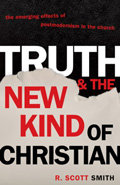
R. Scott Smith
Reviewed by: K. Scott Oliphint
Truth and the New Kind of Christian, by R. Scott Smith. Published by Crossway Books, 2005. Paperback, 206 pages, list price $14.99. Reviewed by Prof. K. Scott Oliphint.
This book is an evangelical response to Brian McLaren's A New Kind of Christian and similar literature (hereafter NKC). According to Smith, NKC takes key tenets from postmodernism and applies them to Christianity. Smith is mainly concerned with NKC's notion of "Truth" and how it is redefined and adapted in a Christian postmodern context.
But what is this (seemingly oxymoronic) Christian postmodernism? In order to answer this question, Smith looks at both the more theoretical side of NKC, as found in Stanley Hauerwas, Brad Kallenberg, Stanley Grenz, and John Franke, and the more ecclesiastical side of NKC (often called the "emergent" church), as represented by Brian McLaren and Tony Jones. What brings the representatives of NKC together are (at least) the following ideas: The "true story" is the story of Jesus. We are not able to know objective truth, since we are on the inside of language and cannot get outside of it. We cannot know the essence of a thing. There is no universal Christian language. The emphasis in our Christian life should be on our stories becoming more and more like that of Jesus (pp. 46-47).
There is a grain of truth in some of these tenets. We are indeed linguistic creatures; in that sense we are "bound" by language. It is a subtle and dangerous leap, however, when one aspect of what characterizes us as human beings - language - is made the determining factor, or foundation, of everything else that we are and do. Smith summarizes the incoherence of NKC: "These writers can make seemingly sweeping, universal truth claims about how things are and how Christians ought to live. This seems to be a rhetorical strategy on their part, for if they were to tell us that a certain local congregation is the Christian community that most shapes their views, then our likely reaction would be, 'So what?' After all, if there is no essence to Christian language, then their so-called 'Christian' language is really just that spoken by a local community. And if there is no essence to language, and language use by local communities makes their world, then that world is just the result of how some specific group of Christians happens to talk. But since we may not be part of that group, why should the rest of us be interested in how they happen to have made their world, when we have made ours according to our own particular language?" (p. 99)
This is the most accessible and helpful evangelical response to NKC and its relatives written to date. As an evangelical response, however, it stops short of being a radical critique. Smith's arguments showing the absurdity of NKC are quite helpful, but his arguments for the alternative, in the end, depend on himself. In a Reformed critique of NKC, the notion of God's own existence and revelation as the bedrock foundations of being and knowledge would need to play a central role. For a fine, informative introduction to what looks to be a continuing problem in the evangelical church, this book provides a helpful and useful overview.
April 27, 2025
The Devoted Mind: Seeking God’s Face in a World of Distraction
April 20, 2025
April 13, 2025
Suffering: God’s Purpose in Our Pain
April 06, 2025
Sunday Matters: 52 Devotionals to Prepare Your Heart for Church
March 30, 2025
On the Trail with a Missionary
March 23, 2025
Midnight Mercies: Walking with God Through Depression in Motherhood
March 16, 2025
© 2025 The Orthodox Presbyterian Church